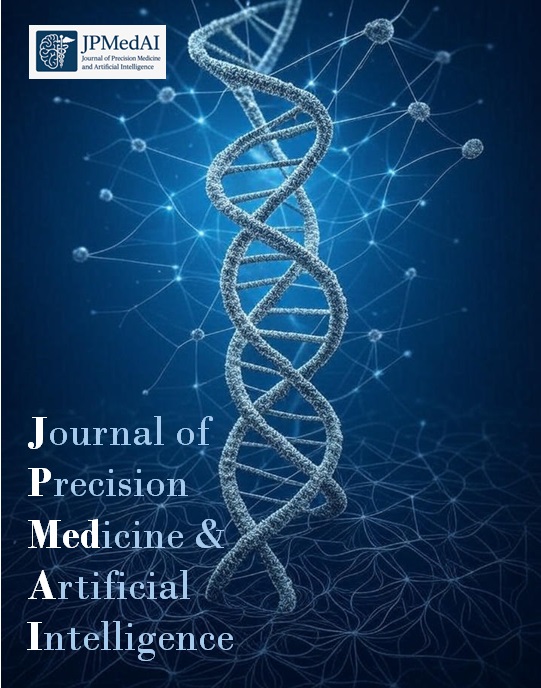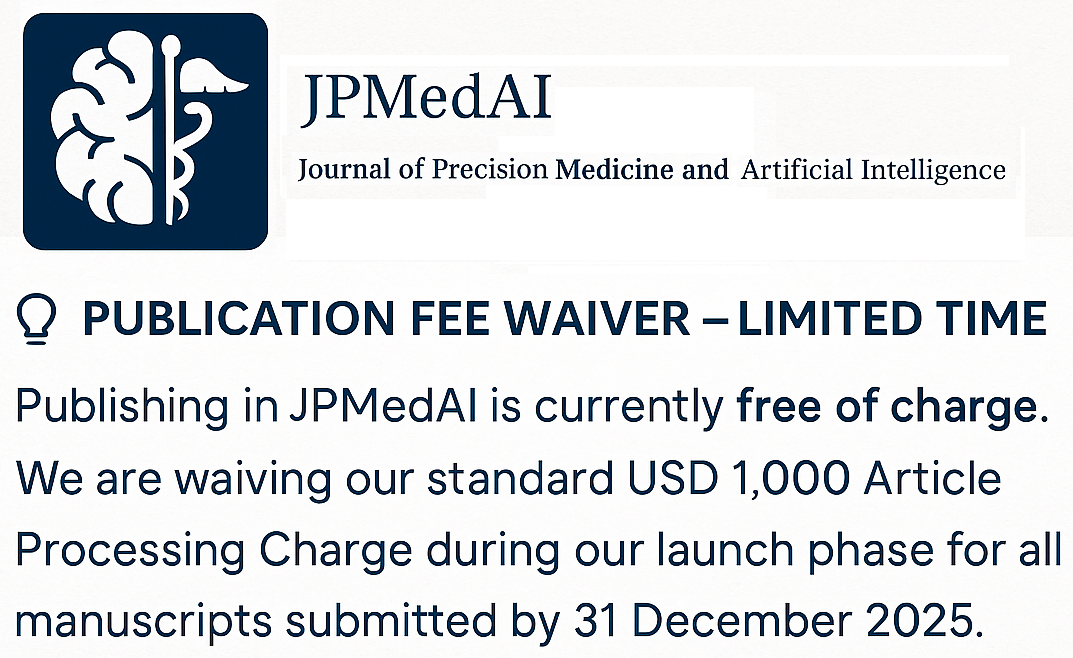
Submissions
Submission Preparation Checklist
Before submitting your manuscript to the Journal of Precision Medicine and Artificial Intelligence (JPMedAI), please ensure that you have completed all the following requirements.
Manuscripts that do not meet these criteria may be returned before peer review.
1. General Requirements
☐ The manuscript is original, not published elsewhere, and not under consideration by another journal.
☐ All authors meet the ICMJE authorship criteria and have approved the final version.
☐ Any conflicts of interest have been disclosed in the manuscript.
☐ The work complies with COPE, ICMJE, and Declaration of Helsinki ethical standards.
2. Manuscript Structure
☐ File format is Microsoft Word (.doc/.docx) or LaTeX.
☐ The manuscript includes the following sections (for original research):
-
Title page
-
Abstract (≤300 words, structured: Background, Methods, Results, Conclusions)
-
Keywords (3–6)
-
Introduction
-
Methods (including ethics approval statement if applicable)
-
Results
-
Discussion
-
Conclusion
-
References (Vancouver style)
-
Figure legends and tables
☐ Page numbers are included and continuous.
3. Figures & Tables
☐ Figures are high-resolution (≥300 dpi) in TIFF/JPEG/PNG format.
☐ Figures are supplied as separate files (not embedded in Word).
☐ Tables are editable and not embedded as images.
☐ Each figure/table has a descriptive legend and is cited in the text.
4. References
☐ References follow the Vancouver style and are numbered in the order cited in the text.
☐ All DOIs are included where available.
☐ Journal names are abbreviated according to the NLM Catalog.
5. Ethical & Reporting Standards
☐ Ethics approval statement is included for studies involving humans or animals, with the name of the approving body and reference number.
☐ Written informed consent is confirmed for identifiable human participants.
☐ Relevant reporting guidelines have been followed (CONSORT, STROBE, PRISMA, TRIPOD, ARRIVE, etc.), with checklists uploaded as supplementary files if required.
6. Open Access & Licensing
☐ I acknowledge that my article will be published under the Creative Commons Attribution 4.0 International License (CC BY 4.0).
☐ I confirm understanding that copyright remains with the authors but that JPMedAI holds the license to publish and distribute the work.
7. Supplementary Materials (If Applicable)
☐ Additional datasets, multimedia, or code have been uploaded as supplementary files.
☐ Data availability statement is included in the manuscript.
Author Confirmation:
By submitting a manuscript, the corresponding author confirms that it complies with the checklist above and JPMedAI’s author guidelines and policies.
An editor may desk reject a submission if it does not meet minimum standards of quality. Before submitting, please ensure that the study design and research argument are structured and articulated properly.
Original Research Articles
Original Research Articles – Full reports of original studies (3,000–6,000 words, up to 6 figures/tables)
Reviews
Review Articles – Comprehensive, critical assessments of the literature (4,000–8,000 words)
Brief Reports
Short Communications – Concise reports of novel findings (≤2,500 words)
Editorials / Perspectives
Editorials / Perspectives – Invited or submitted opinion pieces or letters to the editor (≤1,500 words)
Case Report
Only accepted if they demonstrate unique AI-enabled precision medicine applications
Technical Notes
Technical Notes / Methodology Papers – Detailed descriptions of new AI techniques or applications in medicine (≤3,000 words)
Privacy Statement
The Journal of Precision Medicine and Artificial Intelligence (JPMedAI) is committed to protecting the privacy and personal data of authors, reviewers, editors, and readers. This policy outlines how we collect, use, store, and safeguard information in accordance with applicable data protection regulations, including the General Data Protection Regulation (GDPR).
1. Information We Collect
We may collect the following types of information:
-
Account Information: Name, email address, affiliation, and role (author, reviewer, editor).
-
Manuscript Submission Data: Contact details, author contributions, and manuscript content submitted through the OJS platform.
-
Reviewer Activity: Peer review reports, recommendations, and communication history.
-
Usage Data: Non-identifiable site usage statistics (e.g., pages visited, downloads).
2. How We Use Your Information
We use personal data solely for purposes related to scholarly publishing:
-
Managing manuscript submissions and the peer review process.
-
Communicating with authors, reviewers, and editorial staff.
-
Maintaining records for indexing, archiving, and citation services.
-
Providing usage analytics to improve journal performance and accessibility.
We do not sell, rent, or share personal information with third parties for marketing purposes.
3. Data Retention
Personal data associated with published articles becomes part of the scholarly record and will be retained indefinitely. Account and submission data for withdrawn or rejected manuscripts may be deleted upon request, subject to legal and archival requirements.
4. Data Sharing and Third Parties
Limited data may be shared with trusted third parties that support the publication process (e.g., indexing services, plagiarism detection software) under confidentiality agreements.
5. Cookies
The OJS platform uses cookies to enable essential site functions, including login sessions and preferences. You may disable cookies in your browser, but some site functions may not work correctly.
6. Data Security
We implement appropriate administrative, technical, and physical safeguards to protect personal information against unauthorized access, disclosure, alteration, or destruction.
7. Your Rights
Under applicable laws, you may request to:
-
Access and review your personal data.
-
Request corrections to inaccurate information.
-
Withdraw consent for processing (where applicable).
-
Request deletion of personal data (subject to legal retention requirements).
Requests should be sent to: office@jpmedai.org
8. Use of Artificial Intelligence (AI) Tools in Editorial Processes
The Journal of Precision Medicine and Artificial Intelligence (JPMedAI) is committed to transparency, ethical publishing practices, and compliance with GDPR, COPE, ICMJE, and DOAJ requirements.
To support efficient and high-quality editorial workflows, the journal may make limited use of large language models (LLMs), for specific non-decisional and assistive tasks. These tasks may include:
-
Grammar, spelling, and language polishing of manuscripts
-
Standardizing references and checking DOIs
-
Generating structured metadata (keywords, abstracts, funding information)
-
Assisting in formatting manuscripts into XML (JATS) for indexing
Key Principles
-
No decision-making by AI: AI tools are used only for assistive, mechanical, or language-related tasks. Decisions about peer review, acceptance, or rejection of manuscripts are made exclusively by human editors.
-
Data minimization: Only the manuscript text necessary for the editorial task is processed. Author names, email addresses, and reviewer details are never transmitted to AI tools.
-
No AI training on submissions: Manuscript text is not stored or used to train AI models.
-
Human oversight: All AI-assisted outputs are reviewed and validated by the editorial team before inclusion in the publication process.
-
Compliance with GDPR: All processing of personal data follows GDPR requirements, including signed Data Processing Agreements (DPAs) with AI service providers.
Authors submitting to JPMedAI thereby acknowledge and consent to this limited, transparent use of AI tools in the editorial workflow.
9. Changes to This Policy
We may update this policy from time to time to reflect changes in law, technology, or journal practices. Updates will be posted on this page with a revised “Last Updated” date.


